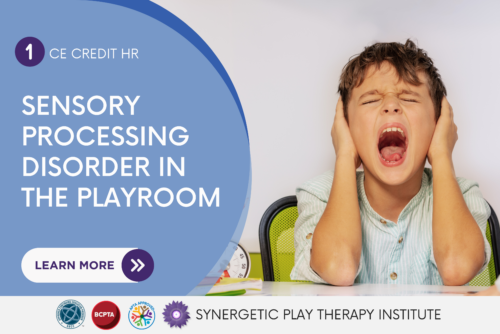-


This program is for you if you work IN SCHOOLS (as a school counselor, social worker or psychologist, or a school-based mental health professional) or if you COLLABORATE WITH educators or schools!
**For all program details and dates of when this program is offered, please visit the Synergetic Education Institute's website**
A Synergetic Approach to Education (formerly One Foot in Education: Exploring Education Through an SPT Lens) offered by our sister institute, the Synergetic Education Institute, is a distinct and transformative approach to learning and teaching, working at the intersection of education and mental health! Synergetic educators recognize that the collaborative efforts of educators, students, classrooms, and educational systems produce a more substantial impact than individual contributions. This approach spans the landscape of working with students and perceived challenges and barriers, considering all aspects of learners and the learning environment. It incorporates neuroscience and nervous system regulation research with empowerment practices to create positive change within the immediate environment while maintaining a broader perspective using integrated and differentiated approaches. You will delve into strategies designed for educational settings that promote trauma-informed, social-emotional support within schools. You'll learn to implement these strategies as well as understand the neuroscience behind them, empowering you to support others in deepening their knowledge and awareness. You will also learn how to...- Implement approaches based on neuroscience that support the development of self-regulation skills, including critical skills that are often missing from SEL programming.
- Support educators in understanding how to prepare brains and bodies to learn, including articulating the links between neurophysiological states and classroom behaviors
- Identify the dynamics behind complex student-adult relationships and how to shift these challenging interactions.
- Increase feelings of safety and belonging for students and adults
- Implement small shifts in daily routines that include explicitly teaching critical skills using both "top-down" and "bottom-up" approaches.
- Reframe “resistance” to meeting educators at their level of readiness.
- Embody Synergetic Play Therapy® principles and collaborate with teachers to empower them and shift their perceptions of students
Program Prerequisites: This program requires that you have taken a Level 1 Introduction to Synergetic Play Therapy® program. This includes the completion of one of the following:- Online or In-Person Introduction to Synergetic Play Therapy® program
- Six-Day Synergetic Play Therapy® Intensive Training (no longer offered)
- Synergetic Play Therapy® Supplemental Course (no longer offered)
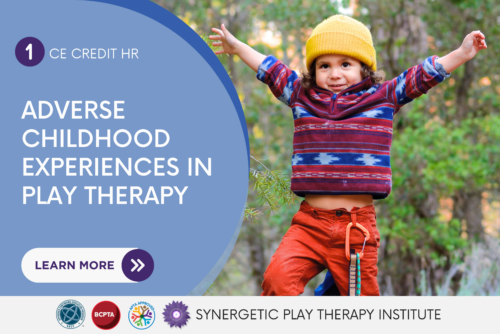 Adverse Childhood Experiences (ACES) can be a part of growing up. But how can we help turn these obstacles into opportunities for growth and resilience and apply this knowledge to the play therapy process? This course explores how play therapy can be used to help mitigate the effects of ACES. Learn the major categories of ACES, along with protective factors or strategies that have been shown to be helpful both in the short-term and long-term. This course is designed to enhance or increase the professional knowledge of graduate-level counselors.
Adverse Childhood Experiences (ACES) can be a part of growing up. But how can we help turn these obstacles into opportunities for growth and resilience and apply this knowledge to the play therapy process? This course explores how play therapy can be used to help mitigate the effects of ACES. Learn the major categories of ACES, along with protective factors or strategies that have been shown to be helpful both in the short-term and long-term. This course is designed to enhance or increase the professional knowledge of graduate-level counselors.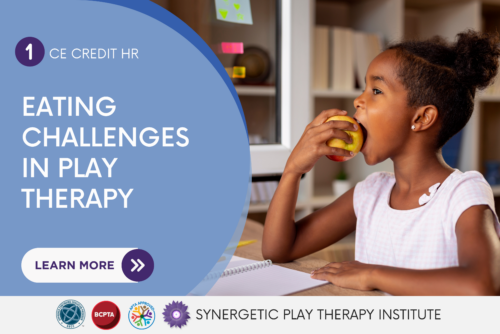 Eating challenges in children can show up in many ways. From the refusal to eat to eating too much, underneath often lies the need for perfectionism and control. Helping kids take these challenges off their plates involves offering choices and uncovering co-existing issues, as well as providing parental support. This course takes a look at this important struggle.
Eating challenges in children can show up in many ways. From the refusal to eat to eating too much, underneath often lies the need for perfectionism and control. Helping kids take these challenges off their plates involves offering choices and uncovering co-existing issues, as well as providing parental support. This course takes a look at this important struggle.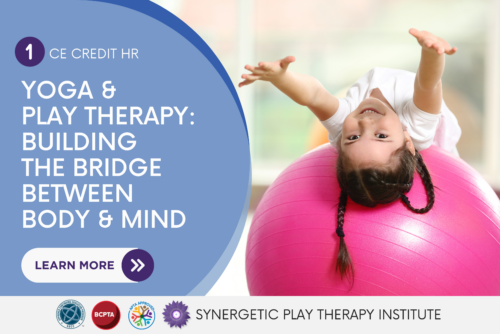 As play therapists, we are often searching for ways to help our clients regulate their emotions and body. This webinar explores how therapists can use yoga to increase their ability to connect with themselves and their clients while facilitating the regulation of emotions and body during play therapy sessions.
As play therapists, we are often searching for ways to help our clients regulate their emotions and body. This webinar explores how therapists can use yoga to increase their ability to connect with themselves and their clients while facilitating the regulation of emotions and body during play therapy sessions.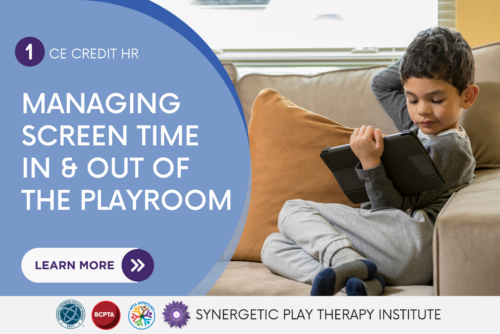 We live in a technological age: there is no pacifying Pac-Man, no axing Apple. But screen time doesn’t always mean zoning out. In moderation, Mickey Mouse and Mario can be our allies, helping children better connect to the world around them. This webinar explores the therapeutic value of screen time and how to use it as part of a play therapy process. Learn how to recognize when a child is using it to avoid and when a child’s use of technology is the perfect entry into the therapeutic alliance.
We live in a technological age: there is no pacifying Pac-Man, no axing Apple. But screen time doesn’t always mean zoning out. In moderation, Mickey Mouse and Mario can be our allies, helping children better connect to the world around them. This webinar explores the therapeutic value of screen time and how to use it as part of a play therapy process. Learn how to recognize when a child is using it to avoid and when a child’s use of technology is the perfect entry into the therapeutic alliance.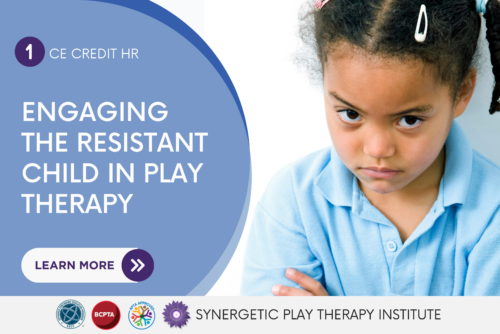 Every therapist has been there – in a session with a child who doesn’t want to come in the room, a child who doesn’t want to do the task, a child who only wants to avoid the issue. This course explores what to do when a child client’s language and behavior say “no.” Join us as we explore resistance, with a focus on differentiating resistance from avoidance and differentiating resistance from the dorsal collapse in the nervous system. Emotional flooding is explored as well.
Every therapist has been there – in a session with a child who doesn’t want to come in the room, a child who doesn’t want to do the task, a child who only wants to avoid the issue. This course explores what to do when a child client’s language and behavior say “no.” Join us as we explore resistance, with a focus on differentiating resistance from avoidance and differentiating resistance from the dorsal collapse in the nervous system. Emotional flooding is explored as well. Divorce. The “D” word. The end of the marital road. A happily ever after run amok. It’s something that often gets a bad rap, especially when we think of the children stuck in the middle. But divorce, while it can be devastating to some kids, can also be a relief for others. Children’s perceptions are not all the same. This course explores how to support children in play therapy when they are experiencing divorce and separation.
Divorce. The “D” word. The end of the marital road. A happily ever after run amok. It’s something that often gets a bad rap, especially when we think of the children stuck in the middle. But divorce, while it can be devastating to some kids, can also be a relief for others. Children’s perceptions are not all the same. This course explores how to support children in play therapy when they are experiencing divorce and separation.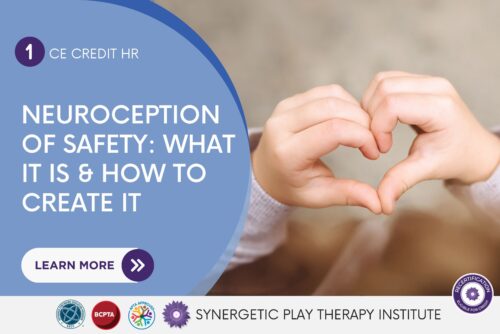 Helping a child heal involves helping them be themselves. One of the best ways to foster this type of environment is to cultivate safety. The therapist knowing the playroom is safe is not enough; the child must know it, too. This course explores what a neuroception of safety is and how to create it within the child and yourself.
Helping a child heal involves helping them be themselves. One of the best ways to foster this type of environment is to cultivate safety. The therapist knowing the playroom is safe is not enough; the child must know it, too. This course explores what a neuroception of safety is and how to create it within the child and yourself.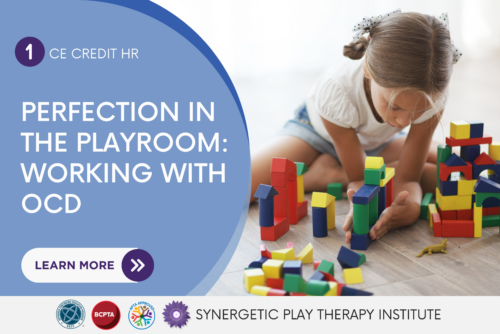 Supporting a child struggling with obsessive compulsions and perfectionism can be incredibly challenging as the desire to move the child out of their rigidity and rituals can overshadow the deeper issues and stressors driving the behaviors. In this course, you will gain an understanding of Obsessive Compulsive Disorder, the behavior of perfectionism, and how play therapy can support the integration of the underlying drivers of the behaviors so as not to intensify the inner struggle that is often experienced by these children as they attempt to stop, control and even deny the urges in their bodies.
Supporting a child struggling with obsessive compulsions and perfectionism can be incredibly challenging as the desire to move the child out of their rigidity and rituals can overshadow the deeper issues and stressors driving the behaviors. In this course, you will gain an understanding of Obsessive Compulsive Disorder, the behavior of perfectionism, and how play therapy can support the integration of the underlying drivers of the behaviors so as not to intensify the inner struggle that is often experienced by these children as they attempt to stop, control and even deny the urges in their bodies.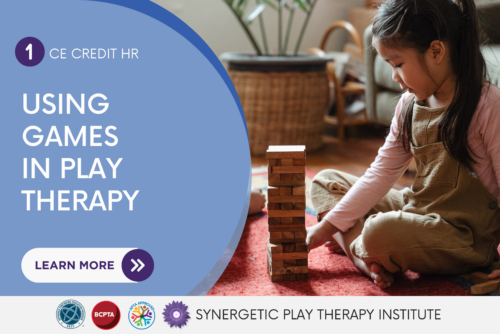 From a stroll through the Lollipop woods of Candyland to a fight over the Thimble in Monopoly, games are part of childhood. In the playroom, certain games are more commonly used than others. How do we use chess as a pawn in our therapeutic healing? How can we call on checkers to check on the child’s state of regulation? What does a game tell us about a child’s emotional world? This webinar explores these questions and more!
From a stroll through the Lollipop woods of Candyland to a fight over the Thimble in Monopoly, games are part of childhood. In the playroom, certain games are more commonly used than others. How do we use chess as a pawn in our therapeutic healing? How can we call on checkers to check on the child’s state of regulation? What does a game tell us about a child’s emotional world? This webinar explores these questions and more!


